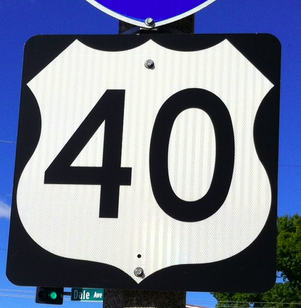When we were kids my brother and I marveled at how all the national newscasters — Cronkite, Huntley-Brinkley, etc. — had Midwestern, i.e., St. Louis, accents. We took it as a sign that we alone spoke proper American English, with no drawl or affectation, unlike the south where everybody sounds like a football coach, or the northeast where you can’t understand a word anybody says.
Even as my accent as softened, the colloquial pronunciations of certain words still come alive in my head as I type. So, for those who like to imagine an author’s voice, and for those who move their lips when they read, I offer the basic “St. Louis Area Pronunciation Manual.” This is a valuable reference guide to be printed out and stuck it on your refrigerator.
The basis of the St. Louis accent is that we pronounce many “or” words as if they were spelled “ar”. But, we only do it sometimes. The rules of our grammar and diction are few and uncomplicated once you get the hang of it. Here we go.
The words “are”, “or”, and “our” are all pronounced as the letter “R”. But, “hour” is “ow-wer”. It is not a homonym of “our”. (Don’t panic; it gets easier.) Follow these rules and read the following sentence aloud. (If you’re in a public place be discreet.)
“You are picking up our parents at either concourse S or concourse R in about an hour.”
Now read it aloud again, and, to get the full effect, speak nasally, like Samantha’s neighbor, Gladys Kravitz, on Bewitched. Good.
Okay, let’s get into specifics. Remember, I said that we pronounce the “or” words as if they were spelled with “ar”, but, not always. Here is the key “or”- “ar” juxtapositions.
“Fork” is pronounced “fark”, but “pork” is not “park”.
The kernel on the cob is “carn”; when a baby comes into the world she is “barn”; and the place you keep hay is your “barn; so, when you neglect to close the front door of the house when you enter, the St. Louis mother will say, “Hey, were you barn in a barn?”
The thing you honk in your car is a “harn”, but a triple X-rated movie isn’t “parn”.
The number following thirty-nine is “farty”, but “port” is not “part”.
Here is an important stipulation as to the pronunciation of certain numbers: The interstate highway that runs east and west is not “farty-far”. It is “farty-four”. And, do you know what number comes after farty nine? It is “fih’-tee” … not “fitty”. If you’re going to pronounce it wrong, get it right. Now, let’s do some math: fih’-tee times two is a hun’-nerd. Got that? Therefore, one-half of three hun’-nerd and eight would be… all together now… a hun’-nerd and fih’-tee four.
You’re ready! Now you can walk anywhere in our community and speak the native language.
Fluently, and without an accent.

I remember moving here to St Louis when I was young. I went out to play and meet our new neighborhood pack of children. I remember running in to the kitchen and crying out to my Mother, “Mother! Mother! I can’t stand the way they speak here! They run all their words together!” and now, of course, so do I.
That accent applies a lot more to the City than the County.
Comments are closed.